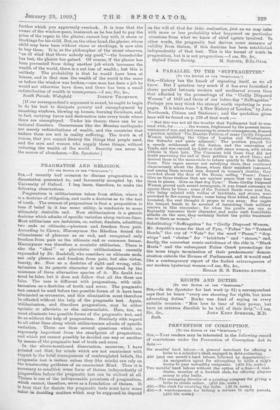PRAGMATISM AND RELIGION.
[To THE EDITOR OP THE ° SPROTATOR.".1 SIR,—I recently had occasion to discuss pragmatism in a dissertation presented to, and favourably accepted by, the University of Oxford. I beg leave, therefore, to make the following observations.
Pragmatism is utilitarianism taken from ethics, where it is a doctrine of obligation, and made a doctrine as to the test of truth. The essence of pragmatism is that a proposition is true if belief in it has some utility, is 'conducive to some ultimately desirable end. Now utilitarianism is a generic doctrine which admits of specific variation along various lines. Most utilitarians are hedonists, or, rather, dualists, admitting two ends as ultimate,—pleasure and freedom from pain. According to Cicero, Hieronymus the Rhodian denied the ultimateness of pleasure as an end, and recognised only freedom from pain as the ultimate end or summuin bonusn. Hieronymus was therefore a monistic utilitarian. There is also the "ideal" or pluralistic utilitarianism recently expounded by Dr. Rashdall, who considers as ultimate ends, net only pleasure and freedom from pain, but also virtue, beauty, &c. Now as a doctrine of right and wrong, utili- tarianism in its generic character is not disproved by the existence of three alternative species of it. No doubt two must be false, but it does not follow that all the three are false. The case is different with pragmatism, with utili- tarianism as a doctrine of truth and error. The pragmatic test cannot be used before two possible forms of it have been eliminated as erroneous, and this elimination must therefore be effected without the help of the pragmatic test. Again, utilitarianism, and therefore pragmatism, may be either egoistic or altruistic or else universalistic. Here, too, we must eliminate two possible forms of the pragmatic test, and do so without the help of pragmatism. Similarly with regard to all other lines along which utilitarianism admits of specific variation. There are thus several questions which are supremely important from the standpoint of pragmatism, and which yet cannot possibly be decided one way or another by means of the pragmatic test of truth and error.
In the above-mentioned dissertation, moreover, I have Pointed out that, for minds which are not omniscient with respect to the total consequences of contemplated beliefs, the pragmatic test is useless unless they (the minds) can rely on the trustworthy guidance of an omniscient Mind. Thus it is necessary to establish some form of theism independently of Pragmatism before the pragmatic test can be utilised at all. Theism is one of the indispensable premisses of pragmatism, which cannot, therefore, serve as a foundation of theism. It IS true that for theists the pragmatic tests must have some Value in deciding matters which may be supposed to depend
on the will of God for their realisation, just as we may infer with more or less probability what happened on particular occasions from what we know of chief agents involved. In other words, the pragmatic test derives some measure of validity from theism, if this doctrine has been established independently of that test. This is the kernel of truth in pragmatism, but it is not pragmatism.—I am, Sir, &o.,






































 Previous page
Previous page